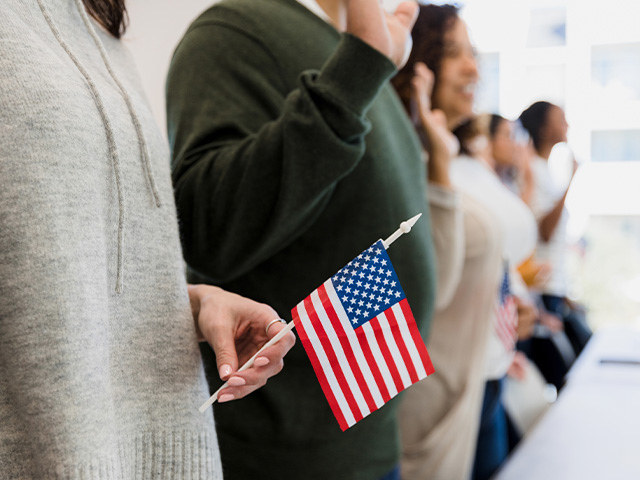
Atlanta Employment Based Immigration Attorneys
Whether you are a non-U.S. citizen seeking to work legally in the United States, or a company willing to employ foreign nationals, the process of obtaining an employment visa is complex and requires an in-depth understanding of U.S. immigration laws and procedures. At the Fogle Law Firm, we have an extensive experience representing and advising employers in all areas of business immigration, including temporary employment visas, permanent residency, labor certifications and other work permits. We assist clients in the preparation of a variety of petitions (e.g. B, E, H, L, O, P, R and TN petitions).
Our attorneys and paralegals represent local, national and multi-national companies with regard to their immigration needs in such industries as software, information technology, design, construction, manufacturing, utilities, arts, sports, health care, and other fields. Our team is composed of attorneys licensed in many states of the US as well as other countries such as France and the UK, tailoring optimal strategies to our foreign clients, as well as efficient procedures of compliance.
EB2 Visa
Foreign professionals with advanced degrees and those with exceptional ability may qualify for EB2 visas. EB2-1 classification can be obtained by foreign nationals, who are members of the professions and who hold advanced degrees, including a person who holds a baccalaureate degree and has at least five years progressive experience in the profession. EB2-2 is available for individuals who possess “exceptional ability” in the sciences, arts or business.
Other than a national interest waiver, detailed below, in order to obtain an EB2-1 and EB2-2, the employer must file a labor certification with the U.S. Department of Labor, showing that there are no United States workers available that are qualified for the specific position applied for. The employer must conduct recruitment as directed by the Department of Labor. The recruitment process includes the posting an advertisement in a professional or major publication. It must be noted that if a minimally qualified United States worker has applied for the position the labor certification would not be approved or “certified.”
Once the Labor Certification is approved by the Department of Labor, the employer may file an immigrant visa petition with the US Citizenship and Immigration Service (CIS). If the employee is in the United States and the priority date is current, the foreign national may apply for adjustment of status at the same time as the immigrant visa petition. If the foreign national is outside the U.S. upon the approval of the visa petition they may obtain the visa at the U.S. consulate abroad.
National Interest Waiver under EB2
Foreign nationals with “exceptional ability” in the arts, science or business or those with the equivalent of a graduate degree who are coming to the U.S. to perform work in the “national interest” of the United States do not need an employer or a labor certification and can petition for themselves under the EB2 category. The Fogle Law Firm has successfully assisted multitudes of individuals with NIWs over the years.
EB3-1 and EB3-2
Foreign “Skilled Workers” who are capable of performing a job which requires at least two years of training or experience, and for which qualified workers are not available in the United States, can obtain EB3 visa classification. To obtain an EB3-1 status, the U.S. employer must obtain an approved permanent Labor Certification, verifying that no qualified United States workers are available to fill the full-time position offered by the company and proof that the foreign national possessed the two years or more of qualifying experience prior to joining the company.
As for foreign professionals, who hold baccalaureate degrees in occupations for which qualified workers are not available in the United States, the EB3-2 classification is available. Just like the EB3-1 classification, in order to obtain an EB3-2 an approved Labor Certification must be first obtained. The employer must show that the job must require a baccalaureate degree and the company must establish that a baccalaureate degree is needed to adequately perform the job duties.
Upon approval of an EB3-1 or EB3-2 visa petition by the US Citizenship and Immigration Service (CIS), the applicant, his/her spouse and children under 21 years of age may apply for their immigrant visas through adjustment of status in the United States or consular processing at a U.S. Consulate abroad.
EB1-3 Visa
The EB1-3 visa classification is available to individuals who have been employed with a company abroad in a managerial or executive capacity for at least one year within the last three years, and who seek to work for a related United States parent, subsidiary, or affiliate of an overseas employer in a managerial or executive capacity. The applicant must meet the US Citizenship and Immigration Service (CIS) definition of a “manager” as someone who manages the organization,
a department, subdivision, function or component of the organization, supervises other managerial employees, and has the authority to hire and fire employees that come directly under his supervision. If the person does not supervise any employees, s/he must hold a senior level within the company with respect to the function managed.
The definition of an “executive” includes one who directs the management of the organization or a major component or function of the organization, establishes the goals and policies of the organization, component or function, and possesses a wide range of decision-making power.
The application for the EB1-3 visa petition must be filed with the US Citizenship and Immigration Service (CIS) office. Once approved, the applicant, his/her spouse and children under 21 years of age can apply for their immigrant visas through adjustment of status in the United States or consular processing at a U.S. Consulate abroad.

Non-Immigrant Employment Visas
The H-1B or “Specialty Worker” visa is available for a United States company who wishes to directly employ a foreign individual, for a temporary period (initially 3 years) in a “specialty occupation.” A specialty occupation is defined as “an occupation, which requires theoretical and practical application of a body of highly specialized knowledge to fully perform the occupation.”
The position or the job for which the foreign national would be hired must be one that requires a baccalaureate or a higher degree or the equivalent, and the degree requirement must be common to the industry or the company must show that it normally requires the degree in such position. The H-1B
specialty worker status is limited to an initial three years period, but can be extended upon application for not more than three more years, for a total stay of six years.
To obtain an H-1B non-immigrant visa, a United States company must file a petition at the regional Citizenship and Immigration Service (CIS) service center. When filing the petition, the company must post a job-site disclosure, declaring the actual salary paid, and all the locations where the foreign national will be employed. The company must also file a Labor Condition Application with the U.S. Department of Labor, attesting that it is offering the foreign national not less than the prevailing salary for such a position in the region of employment.
The filing process for an H-1B petition is quite complicated and the requirements are quite extensive. Therefore, it is recommended that one should seek professional help to prepare it.
L-Visa
The L visa is available for multinational companies seeking to transfer high-level and essential employees from overseas to provide services in a similar capacity to a subsidiary, affiliate, branch or parent company in the United States. This individual employee is called an “intra-company transferee.” The intra-company transferee must have been working abroad continuously for one year by a firm or corporation or other legal entity or parent, branch, affiliate, or subsidiary of the U.S. company within the three years preceding the time of his/her application for an L-1.
She/he must also be coming to the United States temporarily in order to render his/her services to a branch of the same employer, and in a managerial, executive capacity or one that involves “specialized knowledge.”
Categories of the L visa include the L-1A (for an executive or manager) and the L-1B (for a person of specialized knowledge). For an expedited processing of an L visa, many large companies have a blanket L petition approval for their employees who will be entering the United States to work in one of these capacities. Individuals who work for a company, which has a blanket L petition approval, may apply for L visa stamps at a United States Consulate abroad, except for Canadian citizens, who do not need visa stamps, but can apply for L-1 admission directly at a United States port of entry on the Canadian border.

Why Clients Trust The Fogle Law Firm
We combine decades of experience with personalized service, creative legal solutions, and a deep commitment to justice to achieve the best possible outcomes.
-
Proven Track Record in Litigation
We have taken immigration cases to the U.S. Courts of Appeal and even helped create new case law, setting legal precedents that benefit immigrants nationwide.
-
Integrity, Honesty & Passion
We are committed to ethical representation, innovative legal thinking, and fighting passionately for our clients’ immigration rights.
-
Decades of Immigration Experience
With over 30 years of experience, The Fogle Law Firm has successfully guided clients through every stage of the immigration process, from strategic planning to completion.
-
Full-Service Immigration Solutions
Whether you’re an individual, a family, an investor, or a business, we handle everything from simple petitions to complex litigation before the highest courts.
-
Boutique Firm with a Human Touch
Unlike large firms, we provide personalized service and creative legal strategies tailored to each client’s unique immigration goals.
-
Diverse & Multilingual Team
Our attorneys and staff come from around the world and are fluent in English, French, Spanish, Korean, Portuguese, and more, ensuring clear communication with our diverse clientele.


